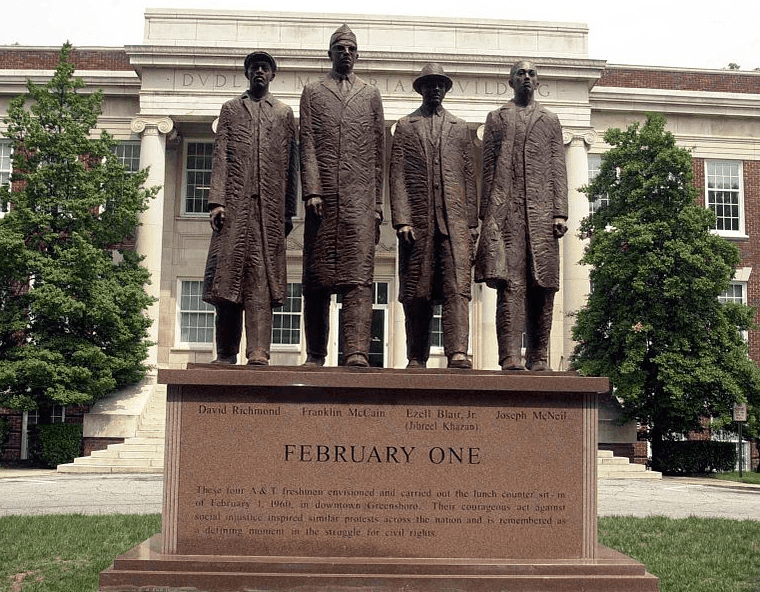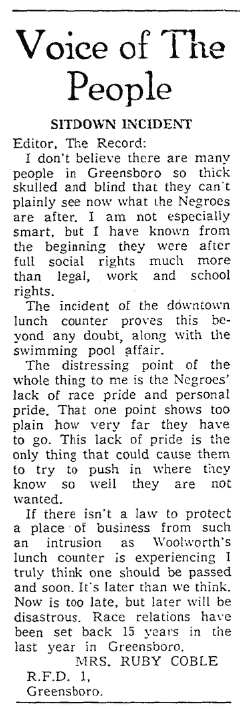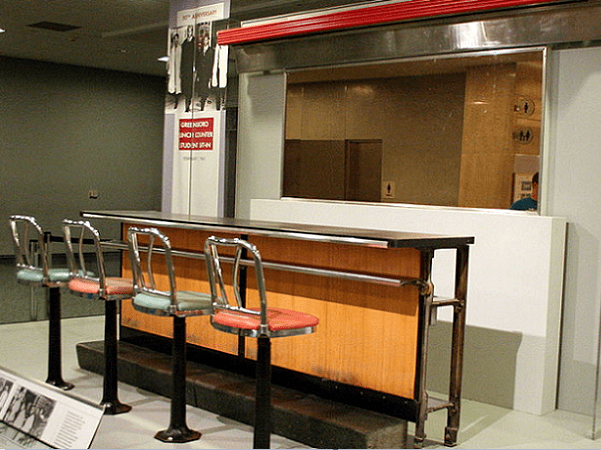An important event in the history of the Civil Rights Movement in America occurred on 1 February 1960, when four African American students from a local college sat down at the segregated lunch counter in the Woolworth’s store in Greensboro, North Carolina. The lunch counter’s stools were for whites only; black customers had to stand and eat. The four students were polite, well-dressed, and stayed quiet, letting their presence speak for them. They were refused service, and ignored.

The four students came back the next morning, with 27 supporters. On February 5, 300 students showed up and peacefully protested, and a movement was born. Similar sit-in protests began to occur at segregated places throughout the South. The media started following these protests and momentum grew that would fuel the Civil Rights Movement throughout the 1960s.
Read this letter to gain a better understanding of the racist attitudes the protesters were up against, sent to the editor of the local paper, the Greensboro Record (Greensboro, North Carolina), and published on 5 February 1960 – the day 300 students protested at Woolworth’s.

Here is a transcription of this article:
Voice of the People
Sitdown Incident
Editor, The Record:
I don’t believe there are many people in Greensboro so thick skulled and blind that they can’t plainly see now what the Negroes are after. I am not especially smart, but I have known from the beginning they were after full social rights much more than legal, work and school rights.
The incident of the downtown lunch counter proves this beyond any doubt, along with the swimming pool affair.
The distressing point of the whole thing to me is the Negroes’ lack of race pride and personal pride. That one point shows too plain how very far they have to go. This lack of pride is the only thing that could cause them to try to push in where they know so well they are not wanted.
If there isn’t a law to protect a place of business from such an intrusion as Woolworth’s lunch counter is experiencing I truly think one should be passed and soon. It’s later than we think. Now is too late, but later will be disastrous. Race relations have been set back 15 years in the last year in Greensboro.
Mrs. Ruby Coble
R.F.D. 1,
Greensboro.
The Greensboro Record published this editorial on 3 February 1960, just two days after the protest began.
Here is a transcription of this article:
Into Sharp Focus
The so-called movement of Negro college students against the “white only” service policy at a downtown lunch counter brought the problem of race relations again into sharp focus.
Another obvious fact is that the “sit down” demand for service, which went unheeded, served the cause of race relations badly. While the incident was without violence, it was nonetheless an attempt to force an issue by public demonstration. Furthermore, it is the sort of incident that an overt act may turn into something serious.
If the organizers of the movement were after publicity, they gained their purpose. Unfortunately, a thing of this sort cannot be ignored by the press and other media. In the absence of accurate reporting of what happened, there would have been all sorts of wild and unfounded rumors. As it was, distorted versions of the incident were heard in the downtown section.
And regardless of publicity given to the Negro students’ march on the store and its lunch counter, there would still be the problem of dealing with the development. While the problem is the immediate concern of the store ownership and management, it cannot be ignored by the community. The store, like all similar places of business, must consider the wishes and interests of all its customers and patrons. We would think, too, that there are legal questions involving the rights of the public to be served and of a place of business to decide whom it will serve.
Undoubtedly, the students’ “sit down” demand for service at the lunch counter will be cited by some persons as evidence that the Negroes are pushing for social privileges as well as legal rights. There have been other indications of that purpose.
One of the student leaders of the movement was quoted as saying that adult Negroes “have been complacent and fearful,” and “it is time for someone to wake up and change the situation… and we decided to start here…”
Then, the president of the local chapter of the NAACP, denying his organization had prior knowledge of the movement, said the NAACP is 100 per cent behind it and prepared to back the group “if any legal action arises.” All this points up the significance of this development.
And, again, it is apparent that Greensboro has been picked as a testing ground for race relations. The statements quoted above make it clear that the Negroes are anything but passive about the matter. The white leadership of the community can ill afford to be passive and indifferent under the circumstances. There is a dangerous vacuum in the relations between the races in Greensboro, we fear.
Note: An online collection of newspapers, such as GenealogyBank’s Historical Newspaper Archives, is not only a great way to learn about the lives of your ancestors – the old newspaper articles also help you understand American history and the times your ancestors lived in, and the news they talked about and read in their local papers – including more recent events.
Related Articles:
